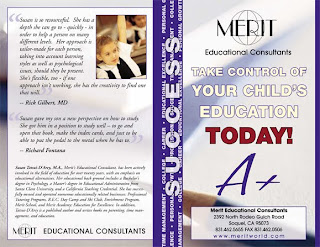WHAT STUDENTS NEED TO LEARN IN HIGH SCHOOL TO PREP FOR COLLEGE
1. The First Rule: There are no tricks or favors to get into college; but remember that colleges are looking for interesting and hardworking students.
2. Academics: English/writing, Math, and a strong Science foundation, Solid Alg. and Geometry foundation for humanities; calculus in high school for science and math majors. Take bio, chem., physics starting in middle school and honors or AP or college classes in high school. When you enter college, you’ll have choices about majors and directions. Don’t get locked into specialty fields in high school, you’ll limit yourself when you get to college.
3. Work Ethic:
- Express ideas in a formal essay format using good grammar, mechanics, and word choice.
- Do all of the problems, review sections, get old texts and do practice exercises, take multiple chapter reviews and review of other subjects to see what you’ve retained.
- Apply knowledge, don't fill in the blanks.
4. Build a solid foundation: The Project
- A. Colleges are looking for students who are excited about something. Americans have become overweight, lazy, and just plain stupid. Young peoples' interest in politics, environment, international affairs, education, or improving themselves intellectually seems to be waning. Teachers don’t require students to start initiatives because they don’t have the time to monitor the projects. Students and parents are too busy to conceive interesting ideas and don’t take the time to complete them.
- B. Select an idea that you are passionate about. If you don’t have any ideas, pick up the paper and read the headlines, stories too. Watch the news. Ask parents and others about issues or problems that need to be fixed. In your research phase, you’ll come across all kinds of ideas.
- C. Find a mentor to help you think through the project. That can be a school teacher, counselor, college prof, scientist, writer, journalist, retired professional, grandparent, etc. Pick up the yellow pages to call people in the field who may be able to guide you as you plan your project.
- D. Most projects will take 2-3 years to complete. Start early. Spend 2-3 months brainstorming; 1 month narrowing your topic based on interviews and research; 3-12 months working on the project production; 3 months on the followup, evals, write ups; 2 months writing press releases; 3-6 months doing public outreach
- E. Why do this? When you complete this project, not only will you be a leader in the industry, you’ll be the utmost expert. You’ll get notoriety, publicity, and press for your portfolio. And most importantly, you’ll know how to do just about anything upon completion of the project. You won’t be afraid to try something you’ve never done before or to enter new territory. It opens your mind so you can really start looking at career options for you.
5. GPA
- A. Still one of the #1 factors in college admissions
- B. Take the most difficult classes, challenging is a better word.
- C. Take AP, IB, classes if they’re offered at your school
- D. Take community college or university classes
i. Take the entire series if you plan to have courses articulate to the college when you enter, if you want to have the classes replace courses you’ll need to take in college, then make sure your high school doesn’t include the college classes on the transcript or considers them part of high school requirements. Colleges don’t like double dipping.
ii. Make sure that the college classes you take will be accepted by the colleges you’re interested in before taking the classes.
6. SAT AND ACT
A. Standardized tests are not going away anytime soon.
B. That said, these tests will the single most important tests you’ll take for college admissions
C. So, roll up your sleeves and learn how to take the test.
D. Use the SAT or ACT practice tests and take them under similar test environment. Use a timer, work in a quiet space, remove dictionaries and other devices from your desk.
E. Review all missed questions and consider the answers. Learn how to look at the test from the test writers’ perspective, it’ll help you improve your scores.
F. Take the practice tests as many times as you need to get your scores in the general area you need to before you take your tests. You don’t want to take the SAT or ACT 12 times; practice for a year or two, if your plan allows, and then take the test just a few times.
G. Your scores will not improve on their own. To improve verbal skills, you need to improve your vocabulary, reading fluency, reading comprehension- break trouble areas into subsections such as these in order to improve and work on them.
































